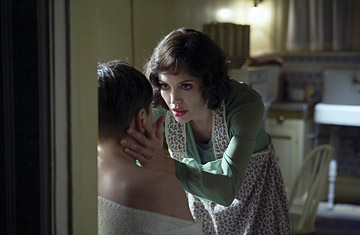
Angelina Jolie stars in Clint Eastwood's Changeling, written by J. Michael Straczynski.
(2 of 2)
A movie with all these gruesome elements could easily be sensational. Maybe this one should have been. Maybe the telling should have a little flair, and a headlong rush toward dreadful truths. But that's not Eastwood's way. He just wants to tell the story, in uninflected, police-procedural fashion; the movie is like a flatfoot following a suspicious trail with no special intuition but an admirable doggedness. It doesn't hurtle, it ambles. You will find, on the Internet, documentation about the Wineville Chicken Coop matter, and the criminality of then-Mayor George Cryer as a pawn of the Crawford mob, of the L.A.-wide corruption that makes Al Capone's Chicago a shining city on a hill by comparison. Eastwood is after just the facts, ma'am. Weaving all the true-crime elements into a film of multilayered, Chinatown density either doesn't interest Eastwood and Straczynski or is beyond their skill set. The motto seems to be: lay it out; get it done.
Eastwood has always been a prolific auteur, and never more so than in his twilight years. Since turning 70 in 2000, he's released eight films as a director, including the Oscar-winning Million Dollar Baby and a feature-length documentary, Piano Blues. On Christmas Day there'll be another movie, Gran Torino, which he stars in as well as directing. He couldn't do this if he didn't work fast (and relatively cheap). Screenwriters love him; if he likes a script, he shoots it without demanding a million rewrites. Actors love him too; if he likes Take One, he prints it and goes on to the next scene. Decisiveness is fine, but it raises the question: What does it take to satisfy Clint Eastwood? Sometimes the answer is: Not much.
Or too much, as here in Jolie's high emoting. With flaring red lipstick on a face that hasn't seen much time in the California sun, and with a grieving matched in severity only by her will to learn the truth, Jolie is supposed to be a regular working mom who rises to meet the challenge of dreadful events. The actress is capable of many things, but being ordinary isn't one of them. Jolie seems to know that her startling, cartoonish, monumental beauty is a handicap here, so she goes bigger in her movements. A stream of tears stains her Kabuki makeup; her sighs come with shrugs worthy of Atlas. Underplaying would have helped. So would the casting of an actress who's less glamorous and, I have to say, more human — someone like Naomi Watts.
As the story expands, and finds new avenues of real-life horror, Jolie can coast on the narrative instead of having to push it with her grit and grimaces. The film becomes an ensemble piece, with a dozen or so character actors carrying the storyline. Finally, Changeling — like most Eastwood movies — is exactly as good as its makings. In its purposeful accumulation of depravities, both individual and institutional, the director's non-style has an honorable payoff that's rare in modern Hollywood cinema: the story's weight could come close to burying you in despair.
You may ask: There's that much evil in the world? And Clint, thinking more about storytelling craft than about Oscar nominations, would say, Sure. But there are heroes too. And this time, the righteous gunslinger is a mom with no weapon but her inexhaustible love.
